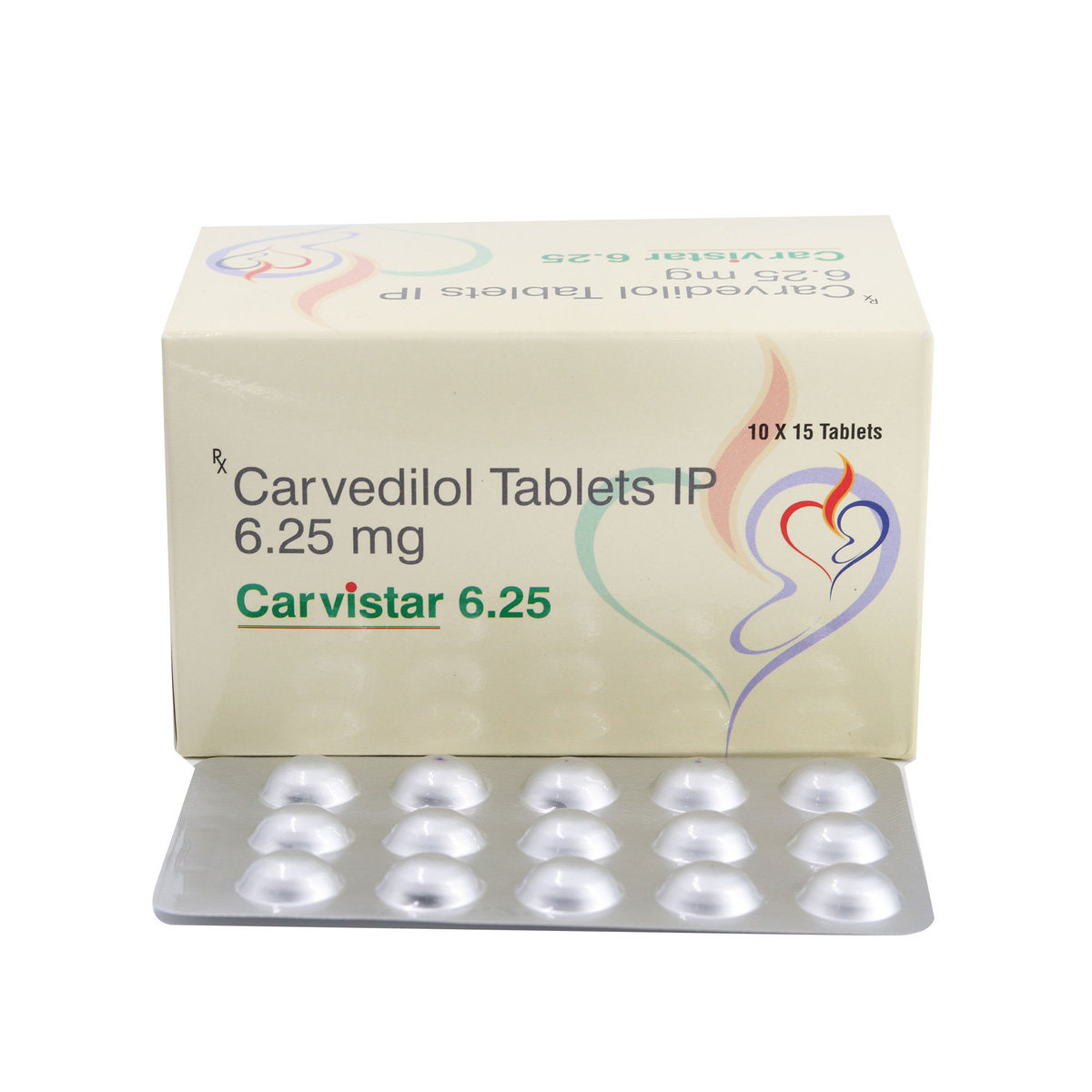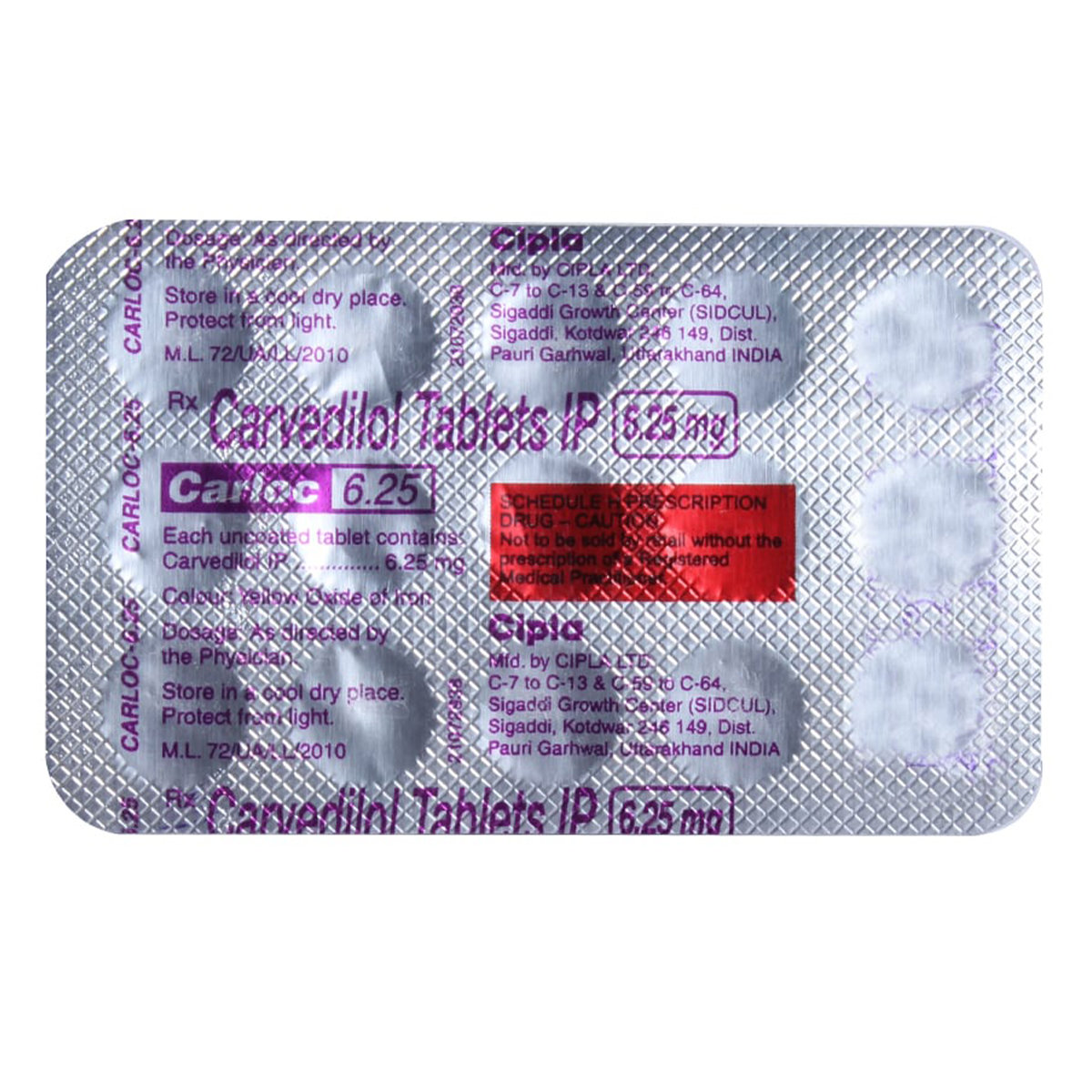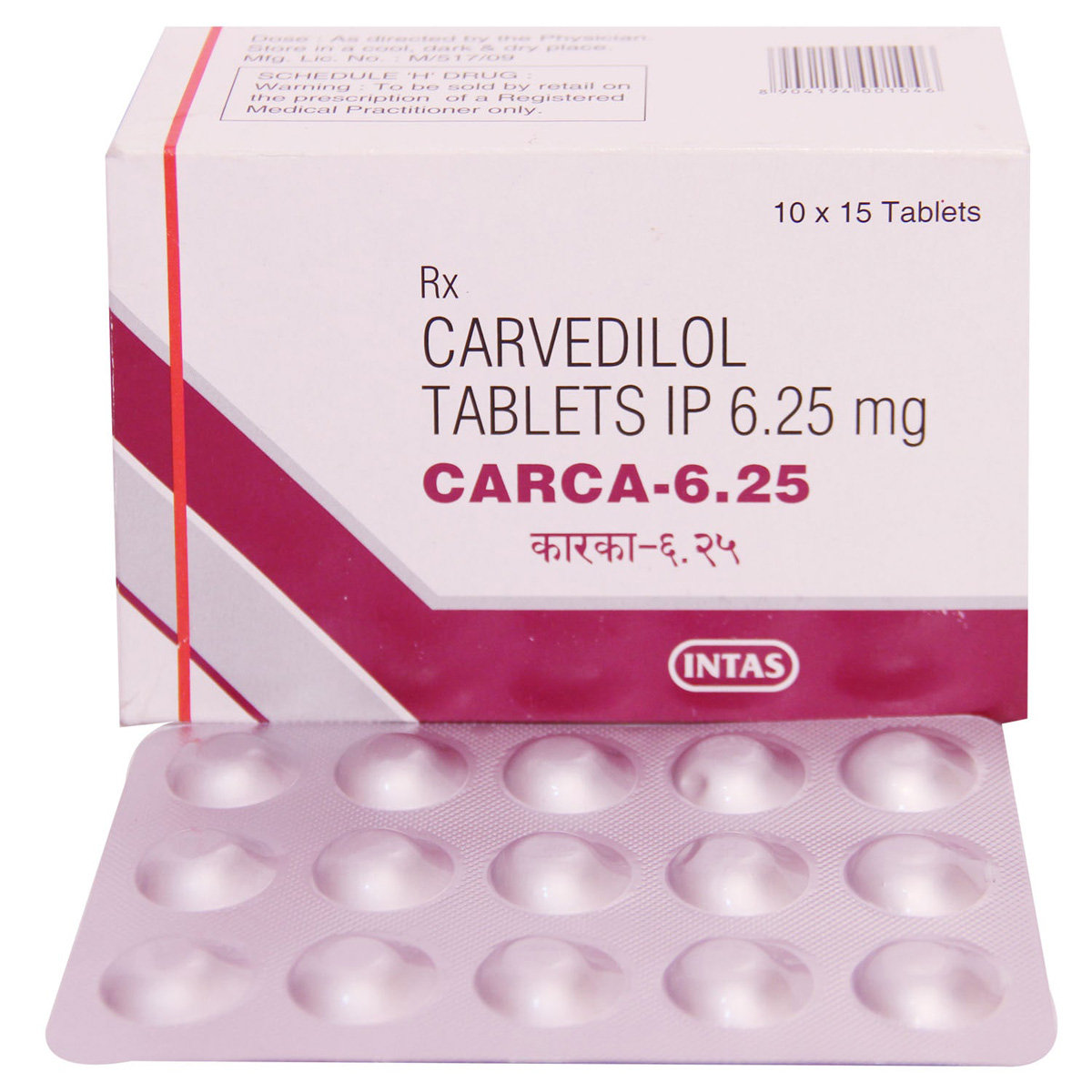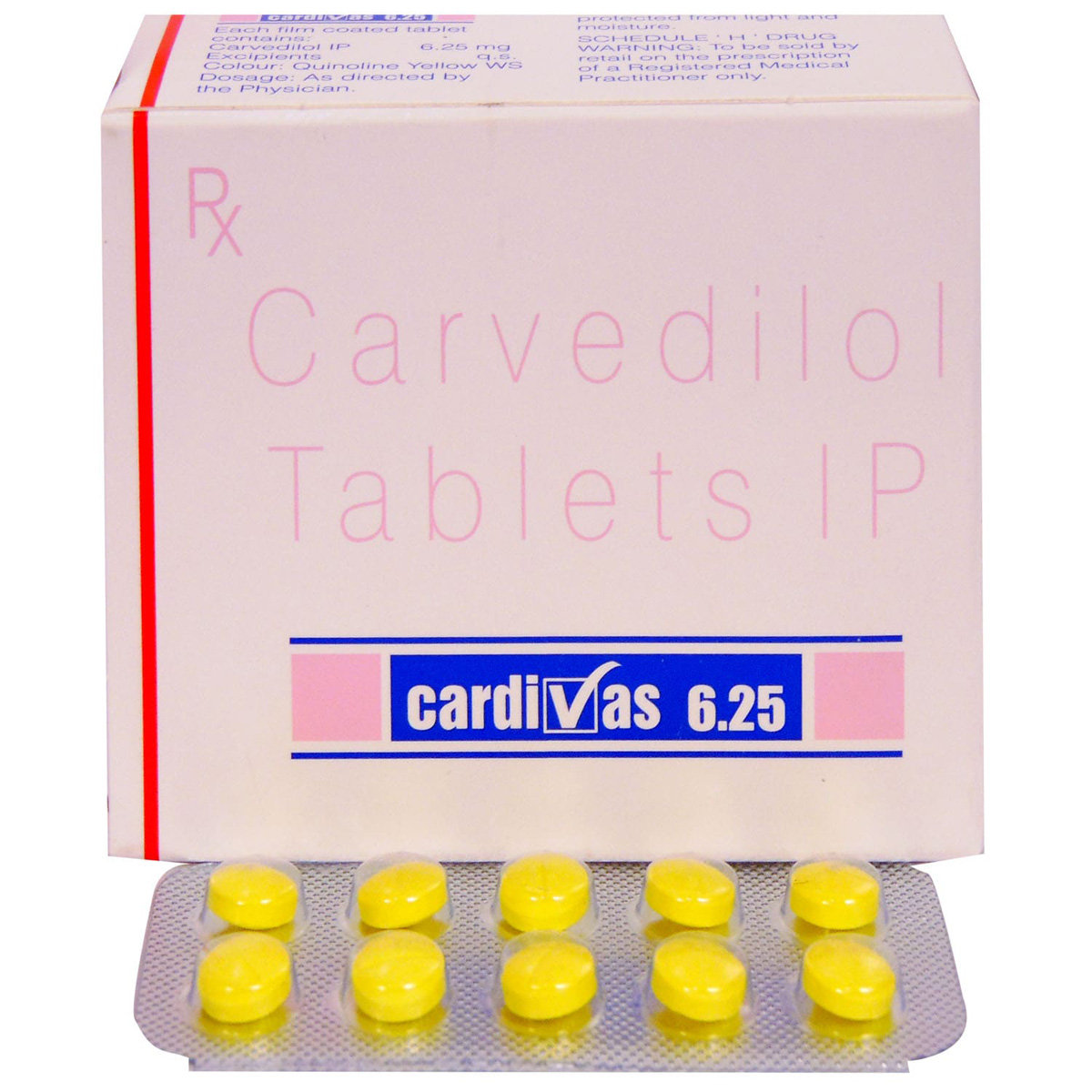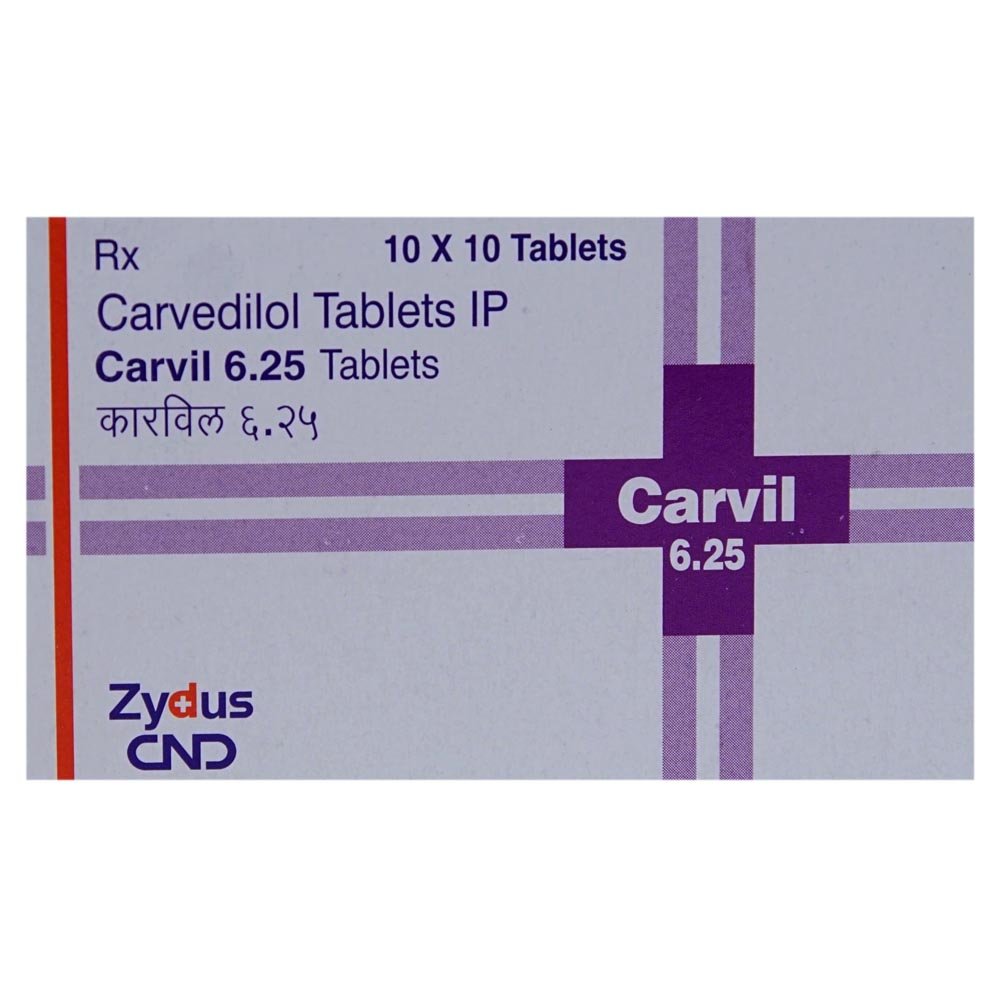Carvefine 6.25 Tablet 10's
MRP ₹50.5
(Inclusive of all Taxes)
₹7.6 Cashback (15%)
Provide Delivery Location
Online payment accepted
 Prescription drug
Prescription drugWhats That
Composition :
Manufacturer/Marketer :
Consume Type :
Expires on or after :
Return Policy :
About Carvefine 6.25 Tablet
Carvefine 6.25 Tablet belongs to a group of 'antihypertensive medicines' called beta-blockers used to treat hypertension (high blood pressure), moderate to severe heart failure, and angina (heart-related chest pain). Besides this, Carvefine 6.25 Tablet also reduces the risk of heart attack or stroke in adults. High blood pressure is a condition in which the force of blood against the artery walls is very high. It will be an addition to the workload of the heart and arteries. If it continues for a long time, the heart and arteries may not function properly and damage the heart, brain, and kidneys' blood vessels, resulting in heart failure, stroke, or kidney failure.
Carvefine 6.25 Tablet contains Carvedilol which acts by relaxing blood vessels by blocking the action of certain natural substances like epinephrine or adrenaline. Thus, lowers the raised blood pressure, keeps the heartbeat slowly reducing with less force, reducing the risk of having a stroke, a heart attack, or other heart problems.
Take Carvefine 6.25 Tablet as prescribed. Your doctor will advise you on how often you take your tablets based on your medical condition. In some cases, you may experience diarrhoea, headache, weight gain, slow heartbeat, dry eyes, tiredness, dizziness, or low blood pressure. Most of these side effects of Carvefine 6.25 Tablet do not require medical attention and gradually resolve over time. However, if the side effects persist, please consult your doctor.
If you are allergic to Carvefine 6.25 Tablet or any other medicines, please tell your doctor. Carvefine 6.25 Tablet is not recommended for children below 18 years of age. If you are pregnant or breastfeeding, please inform your doctor before taking Carvefine 6.25 Tablet . If you are about to undergo any surgery, you must inform your doctor that you are taking Carvefine 6.25 Tablet . Avoid taking Carvefine 6.25 Tablet if you have bronchitis, asthma, emphysema (a lung condition causing shortness of breath), severe liver disease, heart block, slow heart rate, or sick sinus syndrome (abnormal heart rhythms caused by malfunction of the heart’s natural pacemaker). If you have diabetes, coronary artery disease, fluid retention, thyroid disorder, angina (chest pain), kidney disease, slow heartbeats, Raynaud’s syndrome (a circulatory problem), or pheochromocytoma (tumor in the adrenal glands), inform your doctor before taking Carvefine 6.25 Tablet .
Uses of Carvefine 6.25 Tablet
Directions for Use
Key Benefits
Carvefine 6.25 Tablet contains Carvedilol in the controlled release form, which plays a vital role in relaxing blood vessels by blocking the action of certain natural substances in your body. Thereby lowers the blood pressure and reduces the risk of having a stroke, a heart attack or other heart problems.
Storage
- Chest pain may last for a while and needs immediate medical attention as it is a significant health issue to be attended to.
- Take rest and refrain from doing physical activity for a while, and restart after a few days.
- Try applying an ice pack to the strained area for at least 20 minutes thrice a day. Ice pack thus helps reduce inflammation.
- Sit upright and maintain proper posture if there is persistent chest pain. Use extra pillows to elevate your position and prop your chest up while sleeping.
- Rest well; get enough sleep.
- Eat a balanced diet and drink enough water.
- Manage stress with yoga and meditation.
- Limit alcohol and caffeine.
- Physical activities like walking or jogging might help boost energy and make you feel less tired.
Drug Warnings
If you are allergic to Carvefine 6.25 Tablet or any other medicines, please tell your doctor. Carvefine 6.25 Tablet is not recommended for children below 18 years of age. If you are pregnant or breastfeeding, please inform your doctor before taking Carvefine 6.25 Tablet . If you are about to undergo any surgery, you are advised to inform your doctor that you are taking Carvefine 6.25 Tablet . Avoid taking Carvefine 6.25 Tablet if you have bronchitis, asthma, emphysema (a lung condition causing shortness of breath), severe liver disease, heart block, slow heart rate, or sick sinus syndrome (abnormal heart rhythms caused by malfunction of the heart’s natural pacemaker). If you have diabetes, coronary artery disease, fluid retention, thyroid disorder, angina (chest pain), kidney disease, slow heartbeats, Raynaud’s syndrome (a circulatory problem), or pheochromocytoma (tumor in the adrenal glands), inform your doctor before taking Carvefine 6.25 Tablet .
Drug-Drug Interactions
Drug-Drug Interactions
Login/Sign Up
Coadministration of thioridazine with Carvefine 6.25 Tablet can increase the risk of low blood pressure especially when standing up.
How to manage the interaction:
Taking Thioridazine with Carvefine 6.25 Tablet is not recommended, but can be taken together if prescribed by a doctor. However, consult a doctor if you experience any excessive sweating, palpitations, chest discomfort, or shortness of breath. Do not discontinue any medication without consulting a doctor.
Coadministration of Carvefine 6.25 Tablet and Clozapine can increase the risk of low blood pressure.
How to manage the interaction:
Taking Clozapine with Carvefine 6.25 Tablet can possibly result in an interaction, it can be taken if your doctor has advised it. However, consult your doctor if you experience any excessive sweating, palpitations, chest discomfort, or dizziness. Do not discontinue the medication without consulting a doctor.
Coadministration of Methyldopa and Carvefine 6.25 Tablet can reduce the effects of Methyldopa.
How to manage the interaction:
There may be a possibility of interaction between Methyldopa and Carvefine 6.25 Tablet, but it can be taken if prescribed by a doctor. However, if you notice any dizziness, headache, or palpitations, consult your doctor right away. Do not stop using any medications without a doctor's advice.
Taking Carvefine 6.25 Tablet and Indacaterol may reduce the treatment outcomes.
How to manage the interaction:
There may be a possibility of interaction between Indacaterol and Carvefine 6.25 Tablet, but it can be taken if prescribed by a doctor. Do not stop using any medications without a doctor's advice.
Taking Carvefine 6.25 Tablet and Disopyramide can increase the risk of developing side effects.
How to manage the interaction:
There may be a possibility of interaction between Disopyramide and Carvefine 6.25 Tablet, but it can be taken if prescribed by a doctor. However, contact your doctor immediately if you experience dizziness, palpitations, or shortness of breath. Do not discontinue any medications without consulting your doctor.
Taking pazopanib with Carvefine 6.25 Tablet may increase the blood levels of pazopanib.
How to manage the interaction:
Although there is an interaction between Pazopanib and Carvefine 6.25 Tablet, it can be taken if your doctor has advised it. However, consult a doctor immediately if you experience fever, chills, joint pain or swelling, unusual bleeding or bruising, skin rash, itching, nausea, vomiting, dark-colored urine, and/or yellowing of the skin or eyes. Do not discontinue any medications without consulting your doctor.
Taking Morphine with Carvefine 6.25 Tablet can increase the risk of side effects.
How to manage the interaction:
Although taking Morphine and Carvefine 6.25 Tablet together can cause an interaction, it can be taken if a doctor has suggested it. However, if you notice any shortness of breath, dizziness, or weakness, consult a doctor right away. Do not stop using any medications without consulting a doctor.
Taking Carvefine 6.25 Tablet and Terbutaline may reduce the beneficial effects of both medications.
How to manage the interaction:
There may be a possibility of interaction between Terbutaline and Carvefine 6.25 Tablet, but it can be taken if prescribed by a doctor. Consult your doctor immediately if you experience shortness of breath, palpitations, or chest discomfort. Do not stop using any medications without a doctor's advice.
Coadministration of Carvefine 6.25 Tablet and Levosalbutamol may reduce the effects of both medications.
How to manage the interaction:
There may be a possibility of interaction between Levosalbutamol and Carvefine 6.25 Tablet, it can be taken if prescribed by a doctor. Do not stop using any medications without a doctor's advice.
Taking Bisoprolol with Carvefine 6.25 Tablet can increase the risk of low blood pressure and high potassium levels.
How to manage the interaction:
Although there is an interaction, bisoprolol can be taken with Carvefine 6.25 Tablet if prescribed by the doctor. However, consult your doctor if you experience any lightheadedness, excessive sweating, or shortness of breath. Do not discontinue the medication without consulting a doctor.
Drug-Food Interactions
Drug-Food Interactions
Login/Sign Up
Avocado, Beetroot, Cereals, Cheese, Chicken, Black Beans, Eggs, Clams, Chickpea, Whole Grains, Shellfish, Spinach, Salmon, Red Meat, Oysters, Potatoes, Kidney Beans, Mackerel, Milk, Kale, Tuna, Yogurt, Liver, Low-Fat Milk, Trout, Fortified Breakfast Cereal, Fish, Beef
How to manage the interaction:
The effects of Carvefine 6.25 Tablet may be reduced if taken along with multivitamins and minerals. Give Carvefine 6.25 Tablet and multivitamins and minerals at least two hours gap in between doses to avoid interaction. Do not stop taking any medications without consulting a doctor.
Diet & Lifestyle Advise
- Maintain a low salt diet and minimize eating processed foods as they contain more sodium. Try to replace salt with spices or herbs to add flavor to the food.
- Do regular exercise such as cycling, walking, jogging, dancing, or swimming for a minimum of 30 minutes per day.
- Chronic stress may also cause high blood pressure. Therefore, avoid stress by changing your expectations, the way you react in certain situations, and do activities that you enjoy by making time for yourself.
- Maintain a diet that is rich in fruits, vegetables, whole grains, and low-fat dairy products.
- Try to include heart-healthy omega 3 fatty acid-containing foods in your daily diet. You can also use low-fat cooking oil like olive oil, soybean oil, canola oil, and coconut oil which may help in lowering high blood pressure.
- Quit smoking and avoid the consumption of alcohol.
Side Effects of Carvefine 6.25 Tablet
- Diarrhoea
- Headache
- Weight gain
- Slow heartbeat
- Dry eyes
- Tiredness
- Dizziness
- Low blood pressure
Habit Forming
Therapeutic Class
All Substitutes & Brand Comparisons
RX
Out of StockCvl 6.25mg Tablet
Themis Medicare Ltd
₹16
(₹1.44 per unit)
68% CHEAPERRX
Carvibeta 6.25 mg Tablet 10's
Shrrishti Health Care Products Pvt Ltd
₹41.5
(₹3.74 per unit)
17% CHEAPERRX
Carvistar 6.25 Tablet 15's
Lupin Ltd
₹79
(₹4.74 per unit)
4% COSTLIER
Author Details
We provide you with authentic, trustworthy and relevant information
Drug-Diseases Interactions
Drug-Diseases Interactions
Login/Sign Up
FAQs
Drug-Drug Interactions Checker List
- ASPIRIN
- AMLODIPINE
- FUROSEMIDE
- HYDROCHLOROTHIAZIDE
- LEVOTHYROXINE SODIUM
Special Advise
- Monitor your blood pressure regularly and if you notice any fluctuations, please consult a doctor.
- A low salt diet and regular exercise are recommended along with Carvefine 6.25 Tablet for effective results.
Disease/Condition Glossary
Hypertension: Blood pressure is the measurement of the force that the heart uses to pump blood to all parts of the body. Hypertension is a chronic condition in which blood pressure is too high. This condition can lead to hardened arteries (blood vessels), decreasing the blood and oxygen flow to the heart. Raised blood pressure can cause chest pain (angina) and heart attack (when blood supply to the heart is blocked). Additionally, high blood pressure also causes brain damage (stroke) and kidney failure. High blood pressure can be diagnosed with the help of a blood pressure monitor or sphygmomanometer. Systolic pressure is the pressure when the heart pumps blood out. On the other hand, diastolic pressure is the pressure when your heart is at the resting stage between heartbeats. If your blood pressure is 140/90 mm of Hg, it means the systolic pressure is 140 mm of Hg and, diastolic pressure is 90 mm of Hg. Normal blood pressure lies in between 90/60 mm of Hg and 120/80 mm of Hg. If the blood pressure is 140/90 mmHg or greater, it is considered as high blood pressure.

Have a query?
Alcohol
Safe if prescribed
Avoid consumption of alcohol with Carvefine 6.25 Tablet as it may increase the risk of low blood pressure and cause adverse effects such as dizziness, fainting, light-headedness or headache.
Pregnancy
Consult your doctor
Carvefine 6.25 Tablet is a Category C pregnancy drug and is given to pregnant women only if the doctor thinks benefits outweigh risks. Please consult a doctor if you are pregnant.
Breast Feeding
Consult your doctor
Carvefine 6.25 Tablet is excreted in human milk. Therefore, avoid breastfeeding while taking Carvefine 6.25 Tablet as it may cause adverse effects in the baby.
Driving
Safe if prescribed
Carvefine 6.25 Tablet may cause dizziness or tiredness in some people. Therefore, avoid driving if you feel dizzy or tired after taking Carvefine 6.25 Tablet .
Liver
Consult your doctor
Take Carvefine 6.25 Tablet with caution, especially if you have a history of Liver diseases/conditions. The dose may be adjusted by your doctor as required.
Kidney
Consult your doctor
Take Carvefine 6.25 Tablet with caution, especially if you have a history of Kidney diseases/conditions. The dose may be adjusted by your doctor as required.
Children
Safe if prescribed
Carvefine 6.25 Tablet is not recommended for children below 18 years as safety and effectiveness are not established.





